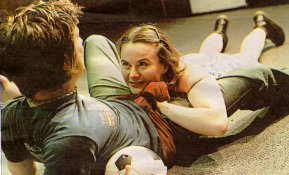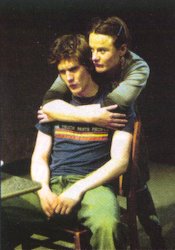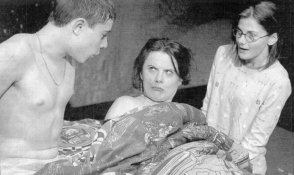
Sliding with Suzanne
The Review Page.

Sliding with Suzanne
The Review Page.
The Out of Joint and Royal Court co-production of this play premiered at the Royal Court Theatre, London in August 2001. This page contains the critical response to this production.

Luka (Bryan Dick) and Suzanne (Monica Dolan)
Tremendous Little Girl Lost.
It takes several deep gulps to swallow the idea on which Judy Upton's dark, eloquent comedy of sexual exploitation precariously depends. Who would believe that the Suzanne of the title, an unattached, unemployed, unstable 35-year-old, of no fixed character, would be allowed to foster a disturbed youth of 16 on her own? Of course, in recent times some social services departments have been damned as catastrophically negligent when it comes to recognising children at risk and in their supposed care. But the Suzannes of this world tend to damage their own offspring rather than be let loose upon other people's.
 Despite this governing implausibility, Sliding with Suzanne proves to be an emotionally
rousing roller coaster. In Max Stafford-Clark,s meticulous, superlatively acted production, a powerful
searchlight is turned upon vulnerable teenagers, stirred by dreams and desires.
Miss Upton sharply contrasts three generations trying to find their way to
happiness. And the character of Suzanne, a Peter Pan-like drifter cracking up
under the weight of non-specific despair, alcohol and unemployment, has the
acrid sting of conviction.
Despite this governing implausibility, Sliding with Suzanne proves to be an emotionally
rousing roller coaster. In Max Stafford-Clark,s meticulous, superlatively acted production, a powerful
searchlight is turned upon vulnerable teenagers, stirred by dreams and desires.
Miss Upton sharply contrasts three generations trying to find their way to
happiness. And the character of Suzanne, a Peter Pan-like drifter cracking up
under the weight of non-specific despair, alcohol and unemployment, has the
acrid sting of conviction.
The scene is Brighton, the childhood base to which Suzanne escapes from dilapidated Cricklewood, and where her lower, middle-class mother, Theresa, provides a cold-comfort welcome. Julian McGowan's set, with photographic backcloths of Beachy Head and the South Downs is suitably redolent Of both danger and romantic escapism. These elements are reflected in Upton's description of Suzanne's sexy, comic encounter with motherless 17-year-old Josh at the local convenience shop and, crucially, with Luka her teenage foster son who arrives in hot, angry pursuit of his quasi - but not exactly maternal – mummy.
Monica Dolan's attractive Suzanne, in her Doc Martens, leather jacket and mockery of a skirt over black tights, is quite tremendous as this slouching girl who never properly grew up. She has all the surprising volatility of a household pet turned nasty. She physically transforms, her face turning blotched and red. To June Watson's winsome Theresa, sedately wooed by the widower next door, and Luka, she betrays the fury and pain of someone whose life has spun into remorseless, premature decline.
Bryan Dick's violent, socially aspiring Luka, who tries to play adult to Suzanne's little-girl lost, Danny Worters's smitten shop boy Josh and Loo Brealey, as his canny sister, make memorable victims of sexual adventuring.
Nicholas de Jongh – Evening Standard 4 September 2001.
When a child tells his or her parents that they don't understand, or that they live in a different world, they can rarely be so accurate as when 35-year-old Suzanne addresses her Mum. In Judy Upton's painful drama there could hardly be a greater difference than that between her 60-year-old mother's developing courtship with her solid, coach driver neighbour, and Suzanne's own alarming relationship with her 16-year-old foster son Luka (Bryan Dick). Loneliness and too much booze has provoked a sexual relationship which Suzanne forlornly tries to escape by running back home to Brighton. Ignorant of Suzanne's plight, all her mother can do is suggest that she should join a dating agency and find a nice man.
There's a clumsiness about some of Upton's writing, especially in the play's early scenes, but she is greatly helped by Monica Dolan's riveting performance as Suzanne, who finds warmth and honesty in a character who could all too easily be dismissed as full of self-pity. It's quite hard to believe that a 35-year-old in London with A-levels can't find a better job than working in a coffee bar when the schools are screaming for teachers, but part of Suzanne's problem is that she no longer knows how to make herself employable. Dolan - whether waking next to a 17-year-old she has picked up in a local supermarket or screaming face to face with Luka - all too effectively suggests someone trapped in an emotional whirlpool. Curiously, Luka is the more responsible one of the pair. Despite the full-frontal aggro, the play is still moving in Max Stafford-Clark's tough production, mainly because of Suzanne's own awareness that she is creating ripples of disaster around her that are engulfing not only herself but also everyone she knows.
Jane Edwardes – Time Out 12-19 September 2001. (Critics’ Choice)
Judy Upton's play is about panic and anger. She is a fighter, but she doesn't know where the war is. She has come home to Brighton to her mother (June Watson) - why? The atmosphere is edgy, belligerent. She lives on fostering and the odd scruffy job. Her current foster son (Bryan Dick) is 16, and their relationship seems oddly fraught. She has A-levels but doesn't think anybody would be interested. This is a bruisingly accurate portrait of a loser who cannot believe that she could over be a winner. The writing can be a bit deliberate, but it has great power and anguish. Would anyone so unstable, though, be allowed to foster? The cocky optimism of the ending left me hopeful but unconvinced. Dolan gives a heartbreakingly fierce and subtly detailed performance that burns and burns in your memory.
John Peter – Sunday Times
A grown up portrait of immaturity.
Judy Upton probably won't thank me for saying so, but her new play, Sliding with Suzanne, comes over as that rarest of phenomena - a contemporary play with a Right-wing agenda. If Margaret Thatcher went to see it she would be appalled by the language and much of the action but would, I suspect, end up applauding its sentiments.
The Suzanne of the title is one of life's feckless no-hopers. Despite having two
A-levels to her name, this 35-year-old slattern has never been able to hold down
a job and blames her lack of success on the fact that only the "posh
kids" prosper. She's concluded instead that being a paid foster mother to
screwed-up kids is the easiest way to survive, though time spent in her care is
likely to leave her charges more screwed up than ever. Her present
"son" Luka, 16, spends most of his time worrying about his mum, who
doesn’t eat properly, gets drunk and stoned, and stays out till four in the
morning. That of course is when Suzanne isn't having sex with him.
slattern has never been able to hold down
a job and blames her lack of success on the fact that only the "posh
kids" prosper. She's concluded instead that being a paid foster mother to
screwed-up kids is the easiest way to survive, though time spent in her care is
likely to leave her charges more screwed up than ever. Her present
"son" Luka, 16, spends most of his time worrying about his mum, who
doesn’t eat properly, gets drunk and stoned, and stays out till four in the
morning. That of course is when Suzanne isn't having sex with him.
In one of the periodic crises in their relationship, Suzanne has fled her filthy London flat to see her old mum in Brighton, who represents all the traditional values her daughter so conspicuously lacks. Needless to say, Suzanne behaves towards her mother like a stroppy teenager, hurling four-lettered abuse at this patient, decent woman, and when mum walks out on her in a convenience store, Suzanne promptly gets off with the 17-year-old shop assistant, Josh, and goes to bed with him. There is however one further complication in Suzanne's already complex life - she's pregnant by Luka.
Upton is a prolific young dramatist of real gifts. Torrid emotional confrontations are combined with sly, and sometimes outrageous humour and she has seized here on an important truth - the inability of large sections of the pampered thirty-something generation to grow up. "I want to be happy. What's wrong with that?" wails Suzanne. The idea that she might have to put in a bit of effort or moral responsibility to achieve that goal appears to be beyond her.
Max Stafford Clark's production for Out of Joint and the Royal Court can't always disguise the fact that the dialogue sometimes plods. And the portrait of the developing autumnal romance between Suzanne's 60-year-old mum (June Watson) and a widowed coach driver (Roger Frost) with a mania for hill-walking and old maps seems both sentimental and too obvious a symbol of the post-war values of thrift and self-reliance.
But the play sparkily captures the poignant confusion of teenagers brought up by parents who are more infantile than they are (Josh and his 14-year-old sister, Sophie, have a grossly overweight, falling-down drunk of a single dad) and the acting is outstanding. As Suzanne, Monica Dolan is sad, vulnerable and funny as well as monstrous, while Danny Worters and Bryan Dick are spot-on as the gauche teenagers who become bitter rivals for her love. Best of all though is Loo Brealey as Sophie, a perfect poignant study of adolescent curiosity and sexual confusion.
In the final moments, Suzanne finally makes the first truly adult and unselfish decision of her life. It doesn’t seem quite enough, though, to justify the feel-good euphoria with which the play ends.
Charles Spencer – The Daily Telegraph 5th September 2001.
Judy Upton's enjoyable Sliding with Suzanne is a well-behaved piece of writing. It could not be less like its central character - a foster mother in need of fostering. Suzanne (played with bolshie zest by Monica Dolan) is pregnant by her 17-year-old foster son, Luka (Bryan Dick). And as if this weren't enough, she's had a one-night stand with under-age Josh (Danny Worters) who works in a corner shop in Brighton. Max Stafford-Clark directs this impossibly difficult customer with characteristic wit and compassion and Upton is excellent on violently disappointed feelings between parent and child. She seems to be saying that love is a privileged state, as affected by economics and education as anything else.
At the back of the stage, designer Julian MeGowan projects a cliff face in a pink haze. The message could not be clearer: Suzanne must come away from the edge before sundown.
Kate Kellaway – The Observer 9th September 2001.
Judy Upton’s grimly enjoyable new play sounds like a parody of a grimly enjoyable new play. A dead hedgehog. A punch in the face. A slap-dash foul-mouthed foster mother who is on the slide and sleeping with young boys, one of them her foster son (Bryan Dick). A picnic on Beachy Head. A knife fight.
But Max-Stafford-Clark’s meticulous, brilliantly acted production is more than a juggling of trendy formulas. It strikes at pain and decency behind the gruesome headlines of the betrayal of children in care.
Monica Dolan as Suzanne is blisteringly watchable and truthful. And the jagged difficulty of the harsh scenes in a notably well-constructed piece are beautifully set off against the burgeoning romance of Suzanne’s mother (June Watson) with her widowed neighbour (Roger Frost).
After playing the Royal Court’s small theatre upstairs, the show should tap into a new young audience on a national tour.
Verdict: Harsh, gritty storyline fosters fine acting.
Michael Coveney – Daily Mail 7 September 2001.
If I ran Brighton's publicity department or Worthing's tourism industry, I'd apply to the High Court for a gagging order on that talented young dramatist Judy Upton. She comes from the Sussex coast and has written about its resorts in Ashes and Sand, Bruises and other plays; but it's not the posh hotels, the bright nighteries, the bowls clubs or the glamorous-granny contests that interest her. Her subject is a subworld which, if we're to believe her, is as deprived and troubled as any in Britain.
Actually, I know that area and do believe her. When the title character in her new play,
Sliding with Suzanne at the Jerwood Theatre Upstairs at the Royal Court, defines
herself and her chums as "people nobody wants,  battered, disappointed,
shat-on", I still believe her. Though this woman's home is technically a
grotty flat in London, she's a native of Brighton, is paying an extended visit
there, and knows the place all too well. Yet there are respects in which
plausibility is a problem, and a serious one.
battered, disappointed,
shat-on", I still believe her. Though this woman's home is technically a
grotty flat in London, she's a native of Brighton, is paying an extended visit
there, and knows the place all too well. Yet there are respects in which
plausibility is a problem, and a serious one.
Monica Dolan's messy-looking Suzanne trails her mother, June Watson's doggedly conventional Theresa, into one of those depressing "convenience" stores that sell Pot Noodles and cat food late at night. Suzanne is surly, rude, aggressive, and everything you expect a teenage daughter to be: except that, all appearances to the contrary, she's not a teenager at all. She’s a 35-year-old professional foster mother who has been looking after adolescents who eat their hair and slash their wrists - and is now tracking down her latest charge, a 16-year-old victim of violent parental abuse called Luka.
Somehow it doesn't add up. It's hard to see how stolid, kindly Theresa's daughter has become the unruly, rebellious Suzanne we meet and still harder to believe that London's often errant but always rule-bound social workers would allow so chaotic a single woman to take charge of deeply disturbed minors. Not only that: she's seduced Luka, is pregnant by him, and continues to love him in a more than maternal way. And the somewhat sentimental ending of Max Stafford-Clark's production suggests that this may be cause for celebration.
True, it's the task of the theatre, and especially of the Court, to give us a mental and moral shaking and, true, Sliding with Suzanne sometimes achieves that. Yet my doubts kept surfacing. Bryan Dick should surely do far more to suggest that Luka, when he appears, is as inwardly angry and dangerous as the text requires. It's hard to believe that this soft-centred boy would flatten a hedgehog with his feet, beat up a shopkeeper, and chase a love-rival with a knife. Has the performance been toned down in order to make Luka and Suzanne more sympathetic? I wonder.
I don’t however, harbour suspicious feelings about the quality of Upton’s dialogue, which can be excellent, or the performances of Watson and Roger Frost as her coach-driver admirer. They’re unimaginative, nerdish, well-meaning, comical, touching. More to the point here: they’re true, through and through.
Benedict Nightingale – The Times 5th September 2001.
Ken Tynan, writing in 1954, said there was no shortage of playwrights. The problem was they were all writing the same play. And watching Judy Upton's perfectly decent new piece 1 had a strong sense of deja vu: the private angst, the incipient violence, the casual sex are all there. The danger is that the new realism is becoming as formulaic as the old escapism.
To be fair, Upton plays variations on a familiar theme. Her heroine, Suzanne, is a desperate 35-year-old who lives in Cricklewood squalor with Luka, her teenage foster son. Escaping to Brighton to see her mum, Suzanne is hotly pursued by the anxious Luka. Given, when foster mother and son finally meet, they storm, rage and shout at each other it comes as no surprise to learn that they are lovers. And what we see is a cats-cradle of desire in which Luka gets his revenge on Suzanne's drunken fling with a Brighton teenager by seducing the boy's under age sister.
Upton's writing is often psychologically acute: in particular she shows the ambitious 16-year-old Luka to be far more level headed than the chaotic Suzanne. Upton also offers a tenderly humorous view of Suzanne's mother and her nervous courtship of a widowed neighbour who likes hill walking and illustrated map covers.
But, although Upton's compassion does her credit, she never fully explains why Suzanne is so screwed up. She puts in the obligatory speech in which Suzanne describes how, after A-levels, she could not get a decent job and was always passed over for posh kids. But it comes across as routine social criticism and leaves one feeling it is a big leap from unemployability to being a sexually voracious foster mother. Fortunately Monica Dolan's performance as Suzanne makes up for some of the gaps in the writing. With her smeared lipstick, leather jacket and Doc Martens, Dolan woman whom maturity has somehow bypassed and who is still living out her teenage fantasies: she also moves from blazing anger to emotional fragility like a taxi turning on a sixpence. It is a wonderfully unguarded performance well supported by Bryan Dick as the surprisingly sane Luka, June Watson as Suzanne's primly ineffectual mum and Danny Worters as a lovelorn Brighton toy boy.
What one craves is more rigorous analysis of what makes Suzanne run. And, while Max Stafford-Clark's production has his trademark precision, it too has a whiff of familiarity: the pulsating pop music intro and even the pre-penetrative spit on the male organ have now become an Out of Joint signature.
I am not asking for novelty for its own sake: simply warning against new drama acquiring its own hardened conventions.
Michael Billington – The Guardian 4th September 2001.

In Judy Upton's Sliding with Suzanne, at the Royal Court Upstairs, 35~year-old Suzanne returns to her childhood home in Brighton. Normally she is to be found in a squalid flat in Cricklewood, where she scrapes a living as a paid foster mother to disturbed children. She is feckless, foul-tempered, awash with self-pity, horrible to her long-suffering mother – and played with such conviction by Monica Dolan that you have to fight back the urge to get on stage and wring her neck.
That even the most incompetent council would entrust young people in its care to such a woman strains belief. But if you can swallow that implausibility, the ructions that follow, involving the foster-son whom Suzanne is having an affair with and a couple of local teenagers, make for a gripping little drama in the Royal Court slice-of-life tradition. There are good supporting performances, including an endearing one from June Watson as Suzanne's mother: Max Stafford-Clark directs with clinical skill.
John Gross – The Sunday Telegraph 9th September 2001.
So well acted is Max Stafford-Clark's Production Of Judy Upton's new play that it initially blinds you to the plot's implausibilities. Thirty-five-year-old, unemployed foster mother Suzanne, dangerously unstable, has fled to her mother in Brighton with hopes of a new life. Following her is Luka, her 15-year-old foster son, with whom she has an intense relationship but who spends most of his time waiting up for Suzanne while she goes out drinking. Once in Brighton, Suzanne falls into a one night stand with a 17-year-old shop assistant; later Luka's jealousy causes events to spiral out of control.
Upton's interest in the devastation social deprivation causes, rather than the specifics of the characters' background has forced her to short-circuit part of the plot: Bryan Dick's excellent mature, seemingly insouciant Luka is, nonetheless, an unlikely damaged teenager And surely the social services wouldn't allow Monica Dolan's Suzanne, constantly spitting with the nervous aggression of a hunted animal, to look after even a bunny rabbit. This aside, Upton revealingly explores how screwed-up relationships between parents and children force people to look for love in the most unpromising places. At the same time, she offers no easy analysis: Suzanne who, at 1east has a mother who loves her, poignantly proves herself more needy of fostering than the teenagers with less reliable parents with whom she associates.
Claire Allfree – The Metro 7th September 2001.
Some theatre myths die hard. One of the most persistent is that because theatre is - like most of public life in Britain – dominated by men, women writers just don't get a look in. So it's nice to be able to celebrate two writers who, in different ways, paint vivid pictures of life in Britain today.
Judy Upton's Sliding with Suzanne is a lurid snapshot of a 35-year-old foster mum who has an incestuous bond with the teenage boy she's looking after. Suzanne is on the skids and Luka is a bit of a headcase, barely able to control his emotions. Set in Brighton - all Seven Elevens and windy clifftops – this desperate story gathers momentum as it cuts across the calmer tale of Suzanne's mum and her love for her neighbour, a widowed coach driver. There's a lot of heated swearing, smelly socks, a crushed hedgehog – and one of the most dangerous climaxes I've seen in years.
Upton's text is often documentary, with issues screaming at the audience like Daily Mail headlines, but she also taps into the powerful dreams and aspirations of people who are often dismissed as poor losers. Her gritty naturalism is superbly staged by Max Stafford-Clark's Out of Joint company, which gives full vent to the piece’s wild dreams and savage emotional intensity.
Forget the wildly improbable idea that the social services - even in Tony Blair's Britain - would allow someone as chaotic as Suzanne to foster damaged children and listen instead to the rasping dialogue, the subtext of neediness and the acidic black humour. It's a stonking piece of in-yer-face theatre.
Aleks Sierz - Tribune 21st September 2001.
Brighton, in the immortal epithet of Keith Waterhouse, is the town which always looks as though it is helping the police with their inquiries; going back more than half a century to Graham Greene's Brighton Rock, it has also always been accepted (on stage and screen as on the thriller page) that something very nasty lies just beneath the surface of that apparently cheery Sussex seaside town. And now Judy Upton's Sliding with Suzanne confirms the theory that whatever kind of trouble you are in before you get to Brighton will be doubled before you leave.
We are in Upton's home territory, at least as a dramatist: earlier plays of hers, such as Ashes and Sand and Bruises have also been about life at the wrong end of the pier, that seaside Sussex hinterland full, as she says, of 'people that nobody wants'. The truth about Upton is that she writes soap-opera of a special kind, and will doubtless soon be profitably employed on EastEnders or Coronation Street. She understands that critically underrated and amazingly difficult tradition whereby you need to keep half-a-dozen characters or more -going through overlapping strands of narrative disasters. Effectively this is plot-knitting, but when it works, when these dysfunctional, inter-related characters finally grab you by the heart, Upton becomes a surprisingly, stealthily powerful dramatist, Among the characters here are Suzanne herself, 35 going on 17, foster-mothering a series of misfits whom she takes to her bed, and that's before we even start on her mother and a widowed coach driver obsessed by route maps.
Max Stafford-Clark's production for his Out of Joint company comes as yet another reminder of how curious it is that he seems to have fallen off the current lists of likely heirs to the National or the Almeida. given his many years at Court and his mastery of the theatrical close-up.
Sheridan Morley - Spectator 15th September 2001.
The Review Pages:
[Everlasting Rose] [Ashes and Sand] [Temple] [The Shorewatchers' House] [Bruises]
[Stealing Souls][Sunspots] [People on the River] [To Blusher with Love] [The Girlz]
[Know Your Rights] [Confidence]
[The Ballad of a Thin Man]
[Sliding with Suzanne]
[ Main Page ]